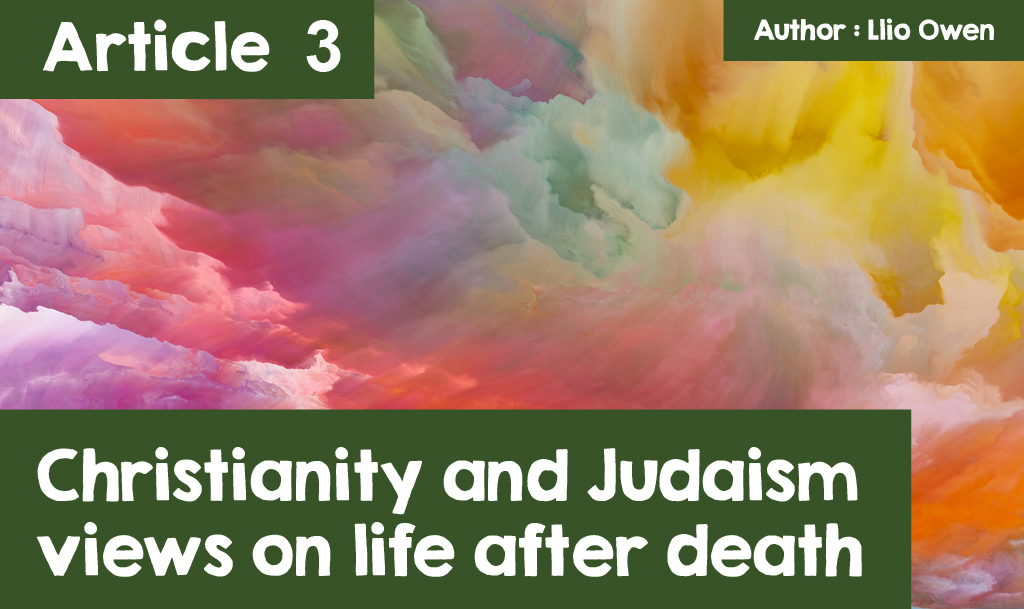Christianity and Judaism views on life after death.
The topic of life after death has been an ultimate question throughout our history, a question so far beyond our reality that it is utterly fascinating to discuss and think about.
• What happens after death?
• Where do we go?
• Is death nothing but darkness?
• Does heaven and hell exist?
We can keep asking these questions, but on this plane of existence it seems that we will never know the answer!
These questions have long been a part of many religions, including the monotheistic religions of Christianity and Judaism. For these religions, belief in life after death is based on teachings in their scriptures or traditions. Often within religion the sacred texts raise and discuss the possibility of life after death, so many times for the followers of a religion an afterlife has been promised by their God. Often surprising for some, Christianity has derived from Judaism and therefore share a number of similar beliefs.
Let’s see if any of their ideas can fuel your imagination and answer any questions you have about the afterlife.

Person falling through colourful clouds
There is one figure in Christianity more popular than any other, Jesus! Alongside many other practices and beliefs, Jesus plays an integral role in the idea of life after death. A Christian’s beliefs on life after death come from Jesus’ resurrection. Christians believe that Jesus’ resurrection is part of God’s holy plan for us as humans living on His earth. As human beings, we can often sin and create evil, therefore Jesus had to pay the penalty for our wrongdoing. This turning-point allowed God’s relationship with mankind to be restored. After Jesus’ crucifixion, God raised Jesus from the dead which has become a symbol for His sacrifice and how He was victorious over sin and death. Although as mortal beings we are condemned to death, those who believe in Jesus and live moral lives will be given eternal life in Heaven.

Communion wine and communion bread
represent the body and blood of Jesus Christ, respectively.
After death Christians believe that Jesus will judge them for their deeds in life, and those who have led good lives and have had faith in God can go to heaven. Jesus said that Heaven is paradise where people will live with God forever and He likened it to a great banquet for all to enjoy. There will be no sadness, pain, suffering or evil there and the last book of the Bible (Revelation) says that God will:
“wipe away every tear from their eyes” (Revelation 21:4)
What happens if we do not live good lives?! Christians believe that if a person chooses to reject God, lead very immoral lives and refuse to repent, they could go to Hell. Hell is a state of being separated from God. All good comes from God so there can be no happiness or enjoyment in hell. Traditionally this is portrayed as a place of fire, often thought to be a symbolic representation of the pain caused by the absence of God.
However, despite such a graphic depiction of hell which is often put forward throughout Christianity, some believers do not believe it exists! Liberal Christians, those who interpret Christian teachings by taking into consideration modern knowledge, science and ethics, do not accept the idea of hell as a place of eternal punishment. Liberal Christians do not take information put forward in sacred texts literally, and so they acknowledge that in the past the idea of Hell could have been used to frighten people into obeying the Church's rules. Many also argue that the existence of Hell would contradict God’s all-loving nature. Would God, who is known to love every being on earth, burn someone in hell for eternity? These Christians do not think that God would punish people so violently for their wrongdoings, but instead believe people will be offered an opportunity to pay back for their sin. Many also believe that everyone will eventually repent and be forgiven.
In some ways, Judaism can be very similar to Christianity as they have originated from the same place. Did you know that Jesus was Jewish?! Let’s see if they agree on the beliefs of life after death.

Jesus Christ
In regards to life after death, Judaism teaches that the body and the soul are one; they are inseparable. The soul has no existence without the body. In Genesis, when Adam was created, it says that God ‘breathed into his nostrils the soul of life’ (Genesis 2:7) Nevertheless, the Jewish Holy Book, The Torah, doesn’t say much about the afterlife; there is no reference to very important Jewish figures like Adam, Abraham, Moses or David living on after death. It was accepted that when they died, although they would live on in the memories of generations to come, their bodies and souls passed away forever. If there was any understanding of an afterlife, it was that the dead were transported to Sheol, a place of darkness where the dead, both good and evil, are sent, but this was not a common idea.

Hanukkah Menorah
was a lamp used in the ancient holy temple in Jerusalem -
now a symbol of Judaism and an emblem of Israel.
More recently, Jewish thinking has come to accept the idea of an afterlife, which they call Olam Ha-Ba. Many Orthodox Jews nowadays believe in some form of resurrection, believing that people will be raised to eternal life in a bodily resurrection at the end of time. Righteous people will be rewarded with eternal life in paradise, while the wicked will be sent to a place of punishment. Many Jewish people believe that this judgement and resurrection will take place after the coming of the Messiah. Nevertheless, Judaism focuses on the here and now, and believe that we should focus solely on how we live this life. In Judaism there are 613 Mitzvot (rules) that a Jew must follow, and concentrating on these are far more important than worrying about what may or may not happen to us after death. We are not able to predict what happens after we die without any experience of it, therefore many believe it is a pointless task to dwell on the possibilities that may be waiting for us.
Thus, we can see clearly that two religions who are rooted in the same early history, and who share a lot of beliefs, practices and commandments view the afterlife completely different to one another. While Christians focus on the afterlife, with some prioritising their place in Heaven before their role on earth, many Jews don’t see a point in exploring a belief that cannot be proved. From looking at these differing views, which one do you mostly agree with, and has it changed your views on life after death?


